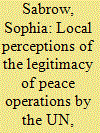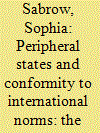| Srl | Item |
| 1 |
ID:
151528


|
|
|
|
|
| Summary/Abstract |
This paper addresses two issues that have only been marginally discussed in the literature about peace operations: First, it investigates the legitimacy of peace operations from the perspective of populations of states that receive them. Secondly, it assesses how host populations perceive different types of peace interventions; by the UN, by a regional organization and by an individual state. A conceptual framework of the local legitimacy of peace operations is applied to an analysis of the perceptions of the French, ECOWAS and UN interventions in Mali in 2013–14. Local perception was measured by an analysis of Malian newspaper articles and interviews with (mainly southern) civil society actors. The results suggest that local actors negotiate between pragmatic and ideological conceptions of legitimacy. While French forces are pragmatically valued for their military achievements, they receive little ideological legitimacy. The regional force has high ideological legitimacy but disappoints in its performance on the ground. The UN force scores low in ideological legitimacy and is ambiguous in terms of pragmatic legitimacy.
|
|
|
|
|
|
|
|
|
|
|
|
|
|
|
|
| 2 |
ID:
173913


|
|
|
|
|
| Summary/Abstract |
This paper seeks to understand the seemingly paradoxical behaviour of states of the Global South, which on one the hand conform to transnational norms in order to integrate into the international society and on the other hand (sometimes simultaneously) differentiate themselves from them. To that end, this article develops the dilemma of the marginalised in order to show that conformity and differentiation become two paradoxical strategies for marginalised actors to pursue the same goal: equality with powerful states. The transformation of the Organisation of African Unity to the African Union, where significant changes in Africa’s policy vis-à-vis global powers took place, serves as a case study to illustrate how marginalised actors struggle between conformity and differentiation in order to claim their place in the international arena. It also shows how the dilemma of the marginalised can be compelling to help us understand the predicaments of marginalised actors across vastly different situations of structural inequality. Acknowledging the dilemma helps us understand their behaviour rather than to dismiss it as irrational, thereby recognising Third World agency in shaping the international system.
|
|
|
|
|
|
|
|
|
|
|
|
|
|
|
|